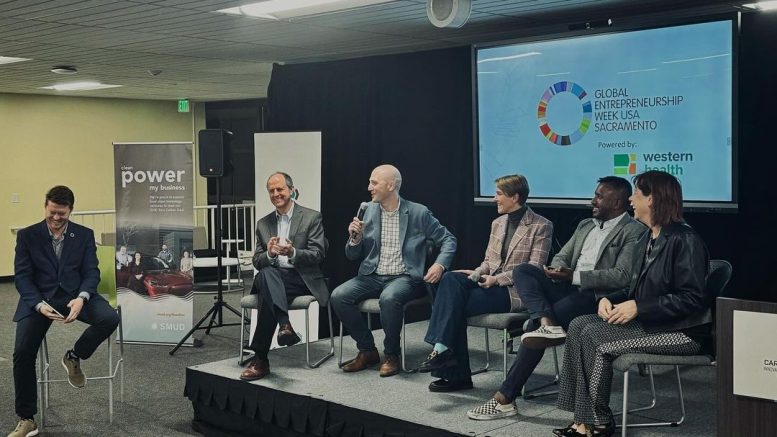By Hannah Ross
The Greater Sacramento Economic Council has launched a new partnership with the Sacramento Entrepreneurship Growth Alliance that will work to enhance the entrepreneurial ecosystem of the local region.
“[We are interested in] how we can better support entrepreneurs and not just starting their organizations, but gaining the resources that they need and accessing the markets to be successful,” said Rachel Zillner, co-chair of the GSEC-SEGA initiative and co-founder of consulting firm Clutch.
GSEC is a public-private partnership that works on economic development projects across key fields like food and agriculture, health and life sciences, and clean technology in the region. This new partnership effectively moves SEGA — a 3-year-old collaboration between Sacramento State’s Carlsen Center for Innovation & Entrepreneurship, Rocklin-based Growth Factory and StartupSac — under the larger GSEC umbrella.
It Takes a Network
As an alliance, SEGA was founded in 2021 to promote collaboration and knowledge sharing across local entrepreneurial organizations. SEGA built the NorCal Entrepreneur Hub as a free resource for entrepreneurs to access organizations, resources and events, and were recently awarded $250,000 by the California Office of the Small Business Advocate (CalOSBA) for its Inclusive Innovation Hubs that will be used to help launch an angel conference to attract new funders for budding entrepreneurs.
In this new partnership, SEGA will benefit from active GSEC oversight, according to Zillner, which will include leadership, access to their network of funders, and collaborative education and outreach programming that supports Sacramento entrepreneurs through every stage of business development across sectors.
“Prior to this, SEGA was a great thing, but didn’t have as many resources as we would like it to,” Zillner said, “It’s like going to the major leagues.”
Cameron Law, executive director of the Carlsen Center for Innovation & Entrepreneurship at Sacramento State and co-chair of the initiative, thinks SEGA will benefit from GSEC’s extensive regional network to provide increased visibility for entrepreneurs, and access to potential investors, mentorship and subject matter expertise.
“Oftentimes, [organizations will] focus on business retention, expansion and attracting new companies to the region, but there’s less [emphasis] on the new entrepreneurial activity and fostering that growth,” Law said. “To create those high-quality jobs that will allow a region to prosper and ultimately thrive, the long-term strategy has to be planting seeds for the future.”
Supporting the sustainability of new businesses and increasing connectivity in Sacramento’s entrepreneurial network are two key goals of the GSEC-SEGA collaboration. Centralizing funding resources, facilitating pitch and investor opportunities for SEGA members, developing more educational programming, and setting up an angel conference are some of the ways they intend to strengthen this bond.
“We’re really in the dreaming space,” Zillner said, “We have to define what it means to be an inclusive, supportive, entrepreneurial ecosystem.”
Assessing Equitable Opportunities
The initiative’s first phase will involve a good degree of assessment: taking stock of the current resources available to entrepreneurs and analyzing how they can be augmented to better support new businesses in the region. SEGA will continue to use evaluation metrics set by Forward Cities, a business strategies group out of North Carolina working on building and sustaining equitable racially diverse entrepreneurial ecosystems.
“We know that there are communities that get an inequitable look, inequitable opportunity,” Zillner said, adding that woman-only founded startups received their lowest amount of venture capital funding since 2016, receiving just 2% of total capital investments in venture-backed startups in the United States. “And it’s not just women. We know that people of color, by and large, also do not receive their opportunity in the same way.”
In October 2023, CalOSBA released its “State of Diverse Small Businesses in California” report led by the California Asian Pacific Chamber of Commerce, California African American Chamber of Commerce, California Hispanic Chamber of Commerce, highlighting the mass potential of minority-owned businesses in California.
Yet, in SEGA’s first evaluation of Sacramento’s entrepreneurial ecosystem using Forward Cities’ 2021 metrics, the local ecosystem scored lowest in narrative and network categories. This means entrepreneurs lacked visibility both in recognition and in acquiring access to capital, programming, education and events.
“This has been a foundation for our early Alliance work,” said Law, citing the NorCal Entrepreneur Hub as an example of past successful strategies. Their second round of data collection — completed Jan. 26 — will directly impact the goal setting for the new GSEC-SEGA initiative.
Zillner said the initiative will work to address inequities in the system first through a comprehensive assessment of Sacramento’s gaps, and second, through connecting new entrepreneurs to regional experts in the GSEC network like the Hispanic Chamber of Commerce, the Black Star Fund, Valley Vision and others.
“We aren’t going to win as a regional economy if our founders and entrepreneurs don’t look like the community that we’re serving,” Zillner said.
This story is part of the Solving Sacramento journalism collaborative. Solving Sacramento is supported by funding from the James Irvine Foundation and Solutions Journalism Network. Our partners include California Groundbreakers, Capital Public Radio, Outword, Russian America Media, Sacramento Business Journal, Sacramento News & Review, Sacramento Observer and Univision 19.


Why would anyone want to be entrepreneurial in a region that bashes business, particularly on this publication?